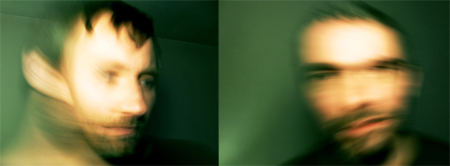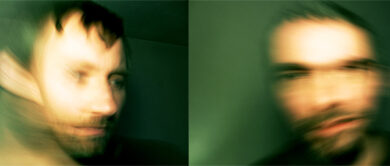Austere envelope-pushing techno duo Autechre are to release their new album via Warp Records later this spring.
Oversteps comes out on March 22nd, and will be released on heavy vinyl, with artwork by The Designers Republic. There’s also a "900mm x 600mm double-sided poster printed on Offenback ultra fine stock" for all soup-makers out there.
Music scribe of note Mr Paul Morley has written an essay about Autechre to go with the release, which we’ve taken the liberty of publishing below:
Autechre, by Paul Morley
What do Autechre mean ? What are they ? There are many questions to ask about the group… who they are, where they come from, how they (re)produce/manipulate/exhibit their sliced split folded selected fused mingled occult wordless music, what they are looking for when it comes to imagining and hearing/hallucinating/capturing sound, are they intent on replacing space with rhythm or rhythm with space or is rhythm and space all the same to them, how many pieces of music they have created, do all their musical pieces connect to each other, or should they be kept apart. What is the sense of it all ?
Wh? aRe th(e)ir ti.tles s o crypt-ic andOR incomplete oRand a little tonginchikk-the driest sense of humour o/r a private game celebrating the necessarily vague and open-ended/a hygienic emptying of connections/typographical errirs3/spell check resisisting. Or the often unprecedented combinations of vowels and consonants, and punctuation marks, gaps and numbers, which can seem like anagrams, or jokey, convenient, short cut abbreviations, or a taunting secret code, or splinters of unknown sentences, reflect the volatile, enigmatic weight, the unknown sources, the perforated otherness of their music.
I like that what Autechre mean, to themselves or to their listeners, is not an easy thing to find out, and that even though there are plain answers to some of the questions about the group…
- Sean Booth (audio engineering and electronics school) and Rob Brown (art school/architecture); then again, their could be many, invisible and scattered, and part of the fascination of listening to Autechre, of savouring their enlightened ways with beat and pressure, force and precision, breath and void, solid and liquid, mass and light, is working out the relationship between the two, and then between the two individually and collectively and the group they belong to, the group (with a mind of its own) they have invented using brain, persistence and machine. Autechre is the changing, challenging result of the “brutally co-operative” relationship between Booth and Brown and their own views of what being Autechre enables them to do as they continue to extend the idea of what Autechre actually is, as a spiralling combination of the two of them and the group itself. This means there are, in a way, three individuals, or units, Booth, Brown, Autechre, and from there, once the technology, the machines, the data, their shared history, the common conditions, the drive, the complicated associations have been factored in, the three become one thing, a single mindbody operating through particular actions, a solemn unyielding mechanical assembly device fully under conscious control.
- Mental dance: if it is music to dance to, and there has always been shattered, shifting, ruptured hints of a supple, repetitive, compulsive instrumental music explicitly made for clubs and dancing, a toiling, receding ghostly-melancholy electro/thread, then ultimately it is danced to inside your head, where there is potentially something the size of the universe, and no limit to the movement, and motion, and dark agile stillness.
- A great name, pronounced however you want to pronounce it, within reason, and made up, possibly, of automatic, technical, replicated, or audio technology research, or author technique resonant, or a random of bashing of letters whilst working using an Atari on a track featuring a defined “au” sound.
- a. The sublime embodiment of rigorous organisation. b. An independent means of exploring reality. c. Suddenly as from nowhere some vital detail hitherto ignored will come into view. d. Conscious and unconscious mental functionings are harmoniously integrated in a singular way. e. cubist dub degenerate psycho-spatial drug cult funk. f. these organic distortions of rhythm cannot be taught, nor achieved by conscious control. g. each stage of composition imposes upon the group new choices and decisions that they could not have foreseen at an early stage. h. imagining brightly a common goal in the world and in the quietness within each human being. i. To feel the submerged depth coherence we must, almost with an effort, abandon the conscious need for logic, order and sequence. Then the superficial fragmentation will not be felt and will be replaced by a feeling of inner necessity far more potent than the needs of conscious reason and logic. j. Throughout history important new music has been blamed for its lack of melody. k. We may feel trapped and lost in the infinite at the same time. l. different ways of organising the shape and motion of a piece of music, of rotating, reframing, replacing the usual order of events, of delaying, or accelerating, or cancelling out, the arrival, or promise, or consolation of a beat, of radically reconsidering what a chorus, or a verse, or a coda, or the beginning, middle and end of a piece of music actually is. But never losing acoustic sight of the practical nature of how certain techniques and traditions must be maintained in order for the piece of music to still be contained inside some sort of skin, or pinned around a kind of spine, so that it doesn’t just bobble off into farcical incoherence. m. in isolation.
- The extraordinary revolution of their music evolves from album to album. There are changes and no changes as one named and numbered collection becomes another, and eventually, once Autechre are done, no more, over and out, it will not necessarily be obvious in which order their music was produced and released, even considering the moves across and inside rhythm, texture and s( )pace they’ve made as they withdrew further and further from any kind of obedient dance stream, getting, so to speak, stranger and stranger, and yet more and more themselves. The pure depths and serial surfaces played, placed and projected during their truly astonishing new collection Oversteps (WarpCD210) certainly reminds me of their earlier music, repeats/reforms some ideas, echoes specific loops, absences and grains, reprises calculations, develops various moods, connects similar stresses and symptoms, perfects certain systems, but at the same time bravely invents new possibilities, resist bad habits, penetrates new uncontaminated areas, and demonstrates that . . .
- It remains the music of tomorrow/still new places to go/still music that hasn’t been heard/silence, and the reality that fills it, has changed at the end of a piece of Autechre music/you are not where/what/who you were.
…these answers – though to a point comforting, and suggestive that there is indeed a recognised avant-pop ensemble called Autechre, late 80s teenage fans of breakdancing, tagging and hip hop, northern disc jockeys plunging into weird wired post-house dance, signed to the visionary Warp label since 1992, temporarily part of some kind of cerebral post-acid movement, legendary sonic step-relations of Aphex Twin, Oval, LaBradford and Squarepusher, virtually inventing experimental IDM, the Led Zeppelin of electronica, unGodparents of Radiohead, remixers of Neu! Tortoise and Skinny Puppy, up to some sort of austere, astounding good, part of a trail, an order, that bites, calculates and throbs, mixing mathematics and the mystical, from, say, Johann Bach, Anton Webern, Pauline Oliveros, Jimmy Giuffre, Steve Reich, Alvin Lucier, Captain Beefheart, Spontaneous Music Ensemble, Tangerine Dream, King Crimson, Throbbing Gristle, This Heat, Art of Noise and Mantronix – don’t help much in understanding their music, and the ways that this music is concerned with various mysteries – about space, time, substance, sound, motion, thought, harmony, scale, truth, reality, memory.
These answers might explain how many records etc they have released, and in what order, during what period of time, connected or disconnected to whatever sequence of pop-culture fads and fashions happened to be passing by. There is a sense of location, of local colour – from Lancashire, to Yorkshire, from the cold, unclubby outside of Madchester to the electronic heart of Sheffield, then to other places, inside and out, and beyond. There is a suggestion of personality, of something surprisingly down to earth, of the everyday, of the moderately helpful, of even the instructional, especially when it comes to equipment used, programmes favoured, machines accumulated, studios built, but also of perversion, of avoidance, of reluctance, of reclusive even superstitious separation from the music, where any explanations ultimately lie, as though it is nothing to do with them, or too much to do with them, and requires a certain protective emotional distance. They might occasionally appear to engage in some form of conventional self-promotion, but before you know it, they’ve slipped through a trap door, dropped out of sight, turned out the lights, moved elsewhere, returned to base, to a black box or two, unknown, but, relatively speaking, known.
There is, indeed, mounds of biographical material and discographical details readily available, these days just the other side of a quick search, that can help safely fix Autechre into the final decade of the 20th century and the first decade of the 21st century, where, to some extent, given their interests, age and technological obsessions, they belong. This search will reveal various ingenious/frustrated/enthusiastic approaches to writing about, describing, understanding and analysing the puzzle, geometry and processes of Autechre, and various arguments, debates, squabbles, speculations, annoyances about how their music has progressed, or not, and how ecstatically alert it is, how mindblowing, or frustratingly opaque, or stubbornly difficult, or totally pointless, or casually random, or not what it was, too dry, too wet, more accessible, less accessible, too this, too that, too sterile, too what. In a way, the shame is that standard definitions, limited terms and conventional expectations culled from reviewing constant humdrum rock releases are applied to what are a fluctuating sequence of meticulously conceived, beautifully engineered works of art that piece by piece relay highly charged, uniquely personal ideas about creativity, thinking, sound, environment, planning, transmission and (self) image and the incredible ways technology can summon up and represent even entirely be the purest, strongest of emotions.
As far as my personal version of Autechre goes, this – now, then, next – is exactly where they belong, at this end of various stories that exist because of a number of cultural, technological, political, ideological, social and musical changes that took place during the 20th century, some of them heating up as the 20th took a turn for the 21st century, some of them slowing down and thwarted, some of them spiralling out of control, some just moving forward following their own glorious, imperturbable momentum. Autechre take their rightful advanced place in various histories of music that have formed in my mind, following, part of, involved with, on one hand something that was known as serialism, which fell through radio, tape and edits into musique concrete, which resulted in the relief of what was known as minimalism, which puts them on the quiet, eternal shores of Morton Feldman, Arvo Part and LaMonte Young, and then they draw from the immense results achieved by Can, Kraftwerk and Eno in using exploratory electronic means to sensitively generate sadness, sensation and sensuality, and a whole host of abstract surprise, and they filter earvisions of Xenakis, Stockhausen and Varese through a privately cultivated handmade machine-smart post-hip hop sensibility. They make the music that has responded the most accurately and inquisitively to the uncompromising strangeness and unsettling changes of the times.
What do Autechre mean ? What are they ? All of the above – it could be. Something else ? Undeniably. There is, fantastically, no end to wondering.



